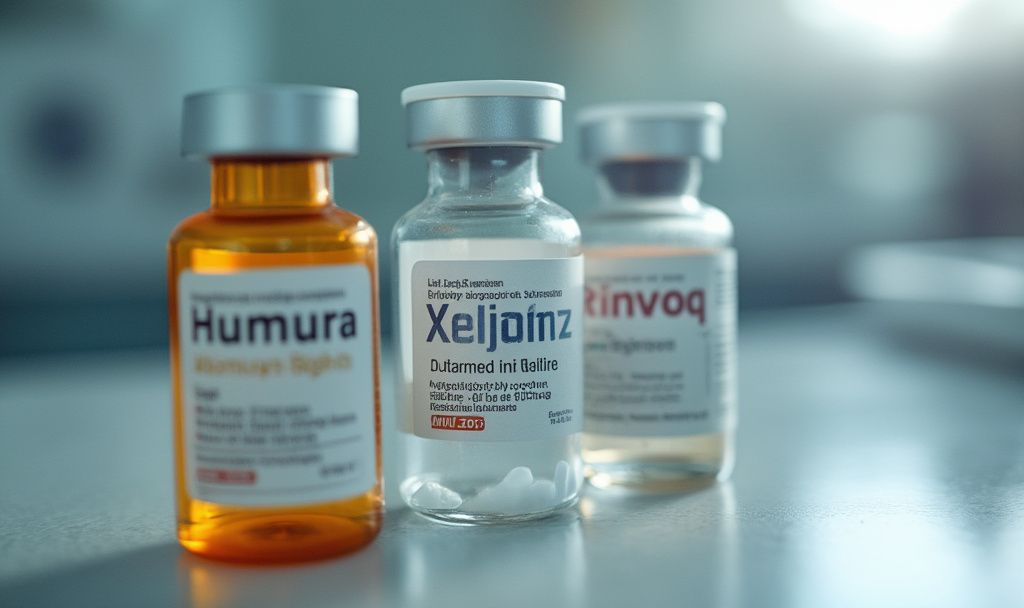- By Halima Orozco
- • Last Updated
Humira Xeljanz Rinvoq: Best Medications Guide
Choosing the best medication for autoimmune diseases like rheumatoid arthritis can be challenging. Humira, Xeljanz, and Rinvoq each offer unique benefits for conditions such as psoriatic arthritis and Crohn’s disease. Understanding these options helps you and your healthcare provider make informed treatment decisions.

When managing autoimmune diseases like rheumatoid arthritis, patients and healthcare providers often look to medications that can provide relief while minimizing side effects. Among the top contenders in this space are Humira, Xeljanz, and Rinvoq. These medications have become well-known options for conditions such as psoriatic arthritis, ulcerative colitis, and Crohn’s disease. But how do you know which one might be the best choice?
Understanding the Medications
Humira, known generically as adalimumab, is a biologic that works by blocking a protein in the immune system that causes inflammation. Xeljanz, or tofacitinib, is a JAK inhibitor that also helps reduce inflammation by targeting specific pathways inside cells. Rinvoq, or upadacitinib, is another JAK inhibitor similar to Xeljanz but may offer different benefits to certain patients.
While these medications all work to ease the symptoms of autoimmune diseases, they differ in several key aspects, such as how they are administered, their cost, and potential side effects. For instance, Humira is typically given via injection, whereas Xeljanz and Rinvoq come in pill form. Learn more about these differences here.
Evaluating Effectiveness and Safety
Patients and caregivers often search for information about the effectiveness and safety of these drugs. Each medication has its own profile of effectiveness depending on the specific condition being treated. For example, Humira has been extensively used and studied, making it a widely trusted option. However, newer medications like Xeljanz and Rinvoq can offer benefits, particularly for patients who do not respond well to biologics. Comparing Xeljanz and Humira can provide deeper insights.
Safety is always a priority when considering these medications. Both Xeljanz and Rinvoq come with warnings about potential increased risks of serious infections and other health concerns, so it is crucial for healthcare providers to weigh these risks against the benefits. Decisions should be guided by clinical guidelines and personalized to the patient’s health history.
The Importance of Cost and Accessibility
Cost is another major factor influencing the choice between Humira, Xeljanz, and Rinvoq. Biologics like Humira are often costly, though assistance programs may be available to reduce expenses. JAK inhibitors may differ in cost depending on insurance coverage and availability of generics or biosimilars. This competition affects drug prices and makes affordability a moving target.
Compare drug costs to see how they stack up against each other. Resources like GoodRx can help patients find more affordable options and make better-informed decisions by accessing these comparison tools. Always consider discussing these findings with your healthcare provider to align affordability with efficacy.
Making the Best Choice for You
Choosing the best medication isn’t just about scientific facts and statistics; it’s deeply personal and can be emotionally taxing. These medications impact daily physical functions and can improve or degrade the quality of life. The “best” choice often varies from one patient to another based on various factors, including their history with other treatments, potential side effects, and personal preferences.
Patients are encouraged to join support groups and engage in discussions about their medication decisions with loved ones and healthcare providers. Advocacy groups provide further room for conversation and can offer guidance through experiences shared by others. This communal support is invaluable, especially when evaluating medications such as Rinvoq and others.
Final Thoughts on Humira, Xeljanz, and Rinvoq
While deciding among Humira, Xeljanz, and Rinvoq, it’s essential to consult healthcare professionals who can provide personalized medical advice. Each has unique benefits and drawbacks, and what works best can differ widely from one patient to another. Understanding these options provides a clearer path to finding a medication that aligns with individual health goals.
Although the choice can be complex, having access to reliable resources and expert guidance can make it a more manageable process. Whether you’re comparing JAK inhibitors like Xeljanz and Rinvoq or exploring the long-standing benefits of biologics like Humira, knowledge plays a critical role in empowering patients to make the best decisions for their health.
Frequently Asked Questions (FAQs)
What are the key differences between Humira, Xeljanz, and Rinvoq?
Humira is a biologic given via injection that blocks a protein causing inflammation, whereas Xeljanz and Rinvoq are JAK inhibitors in pill form targeting specific cell pathways. Their administration, cost, and side effect profiles also differ.
How does Humira work for rheumatoid arthritis?
Humira works by blocking a protein in the immune system known as TNF, which reduces inflammation and alleviates symptoms of rheumatoid arthritis.
Which is more effective: Xeljanz or Rinvoq?
The effectiveness of Xeljanz and Rinvoq can vary based on individual patient conditions. Rinvoq might offer different benefits to patients, especially for those who do not respond well to other treatments.
Are there serious risks associated with Xeljanz and Rinvoq?
Yes, both Xeljanz and Rinvoq come with warnings about increased risks of serious infections and other health concerns, which requires weighing these risks against their benefits.
Why is cost an important factor in choosing between Humira, Xeljanz, and Rinvoq?
Cost is crucial because biologics like Humira can be expensive, while prices for JAK inhibitors like Xeljanz and Rinvoq vary based on insurance coverage and availability of generics or biosimilars.



